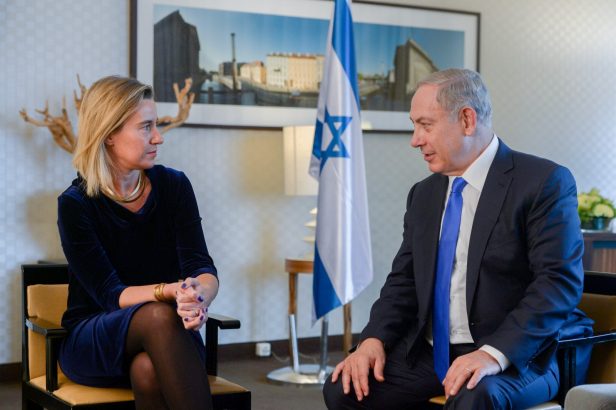With leadership changes on the horizon in both Brussels and Jerusalem, both Israelis and Europeans will have the chance to repair their relationship, suggests Margaux Nijkerk. This article first appeared at the Israel Policy Forum.
In recent years, Prime Minister Benjamin Netanyahu has executed Israel’s foreign policy in an increasingly personal style. He retained the coveted foreign affairs portfolio for nearly four years, almost the entire duration of his last government, and recent electoral campaigns depicted him alongside the heads of major world powers, cast as the Israeli leader in ‘another league.’ Yet, despite Netanyahu’s much-touted ‘friendships’ with figures like US President Donald Trump, Russian President Vladimir Putin and Indian Prime Minister Narendra Modi, the Israeli premier often found himself at loggerheads with Israel’s largest trading partner and a critical defense and political ally: the European Union. But after years of on-and-off spats, leadership changes in Jerusalem and in Brussels could present both risks and opportunities for the EU-Israeli relationship going forward.
The Israeli justice system is closing in on Benjamin Netanyahu amid pending indictments for corruption, fraud, and breach of trust in three cases. The country’s politics are in disarray, and after a second Knesset election in the space of one year, the prime minister was once again unable to form a government, passing off the mandate to Kachol Lavan rival Benny Gantz.
While it is too early to write Netanyahu off conclusively, his exit from politics looks more likely than at any point in the previous decade, and this could provide room to better relations with the Europeans.
But when Netanyahu ultimately does step down, he won’t be alone in retirement. Federica Mogherini, the High Representative of the European Union for Foreign Affairs, will be leaving her position after her term ends in November and Josep Borrell, a former Spanish foreign minister, will take over. On the one hand, he is also a new face and Mogherini and Netanyahu’s personal relationship was particularly acrimonious. Thus, with fresh leadership in both Europe and in Israel, there is an opportunity to start anew. On the other hand, Borrell has also been vocal in his criticism of Israel policies regarding the conflict with the Palestinians, which could compound existing Israel-EU tensions.
There is precedent for robust Israel-EU relations. In 1959, Israel was one of the first countries to establish relations with the EU (then the European Economic Community). By 1976, the two reached their first trade agreement. Even today, Israel and the EU work together in many areas, including transport, agriculture, and security. Over the past few years, the EU accounted for 40 per cent of outgoing Israeli investment. In 2018, for the first time ever, more Israeli postgraduate students chose to study in the EU than in the US. The EU has also played a substantial role in widening Israel’s scientific research and innovation sector, and with the EU’s Horizon 2020 project, over 1,245 projects will receive funding of over $190 million. Lastly, Israel is a part of the Union for the Mediterranean, which promotes cooperation through projects in the Euro-Mediterranean region.
But the relationship is also characterised by public disagreement in recent years, and nowhere has this strain been more acute than on the Palestinian question. The Israeli leadership remains frustrated by European-Palestinian Authority ties. The EU is the PA’s primary financier and a major backer of the Palestinian education system. Because of this aid, Israelis may see the Europeans as abetting Palestinian incitement in schools (although the EU froze over $16 million of aid in May over incendiary material in PA textbooks). The EU embraces a vision of Israeli-Palestinian peace that sharply contrasts with the increasingly annexationist tilt in Jerusalem and the acquiescence of Israel’s American patrons to these Greater Israel ambitions, with Brussels continuing to advocate a two-state solution. Like most other countries and international bodies, the EU does not recognise Jerusalem as Israel’s capital under present circumstances, and maintains its diplomatic offices in the Tel Aviv area.
While the EU and Israel disagree at a government level over the peace process, Netanyahu has personally contributed to the cooling of relations. Although Netanyahu became the first Israeli prime minister to meet the EU leadership in Brussels in over two decades when he visited in 2017, his trip was mostly a political stunt to request European recognition of Jerusalem as Israel’s capital, a request he knew ahead of time would be declined.
Netanyahu has also looked to sow division among EU member states, courting the minority of European governments who may be more amenable to his position at the expense of the larger bloc. The Israeli prime minister has demonstrated particular affinity for Eastern European countries, including the Visegrad Group, an alliance comprised of Poland, Hungary, the Czech Republic and Slovakia. Six months after Netanyahu’s visit to Brussels, he was caught on tape bashing the supranational entity before Eastern European leaders and calling EU treatment towards Israel ‘crazy.’
His lobbying has even borne some fruit. In May 2018, Hungary, the Czech Republic, and Romania, in coordination with Israel, successfully blocked an EU statement condemning the relocation of the US Embassy to Jerusalem. In February 2019, Netanyahu also hosted a Visegrad Group summit in Jerusalem. Due to Polish-Israeli tensions, the summit was ultimately cancelled, but Netanyahu did meet with leaders of the other three Visegrad members. Netanyahu’s biggest successes in this area came the following month, when Hungary announced it was opening a trade office in Jerusalem, becoming the first EU state to establish a diplomatic outpost in the city and marking a shift away from Brussels’ policy. Officials in Brussels and Western European governments, already ill at ease about the right-wing and nationalist tilt in Eastern and Central Europe, perceive Netanyahu as only deepening the intra-EU divide.
Benny Gantz’s path to the premiership is far from certain. If Netanyahu somehow manages to claw his way back to the prime minister’s office, he could inflict further harm to EU-Israel-ties. But Netanyahu will not be in office forever, and whether next month or next year, his successor will have to take ownership of the kind of broken EU-Israel relationship Netanyahu has developed. If he can cobble together a government, Benny Gantz may have an opening to patch things up with the Europeans. His positions remain somewhat unfamiliar to EU leaders, but he can leverage this ambiguity to his advantage. Because of Netanyahu’s neglect for the Europeans, Gantz could invite EU leaders in order to distinguish himself from his predecessor.
While Gantz has made an effort to distinguish himself from Netanyahu in the domestic arena, he remains vague on foreign policy questions and the Palestinian issue. Gantz has said his government would not ‘build in a wild manner in order to thwart diplomatic opportunities,’ but he avoids explicitly endorsing a two-state solution and has stated that the Jordan Valley ‘is part of Israel forever.’ But this was Kachol Lavan in campaign mode, when Gantz and his running mates had to appeal to Netanyahu voters. Once in office, the carrot of improved relations with Europe may provide Gantz with an incentive to more clearly articulate his own vision for a future Israeli-Palestinian arrangement.
The deterioration of EU-Israel relations has not been a one-sided affair. Mogherini did not get on well with Netanyahu, and only came to Israel once during her tenure (a second visit was scheduled but subsequently cancelled). Borrell’s perceived pro-Palestinian and anti-Israeli stances could further inflame current Israeli perceptions of the EU as a biased mediator in the peace process. Borrell, a Catalan socialist, was outspoken in his support for the Palestinians during his tenure as Spain’s foreign minister, even advocating for Madrid’s unilateral recognition of a Palestinian state, and issuing public criticism of Israeli military actions in Gaza. Borrell will inherit a fractured European relationship with Israel. Both Borrell and his Israeli counterparts should be prepared for this. It is not in the EU’s interest to damage ties with Israel without cause, but Borrell is also unlikely to suddenly abandon his own strongly held convictions.
The depth of Israel’s relationship with the EU is undeniable. With leadership changes on the horizon in both Brussels and Jerusalem, both Israelis and Europeans should be prepared to let past disputes go and move forward in repairing their relationship. If Benny Gantz assumes the premiership in Israel, he can set himself apart from his predecessor by engaging with the EU leadership in Brussels rather than undermining them to split the bloc. For his part, Borrell should understand a change from Israel as a step taken in good faith and respond accordingly. After years of counterproductive sparring between the EU and Israel, new faces in both governments can help revitalise relations, but they also risk continuing the present downward spiral, and the damage may become more irrevocable the longer things deteriorate.






































